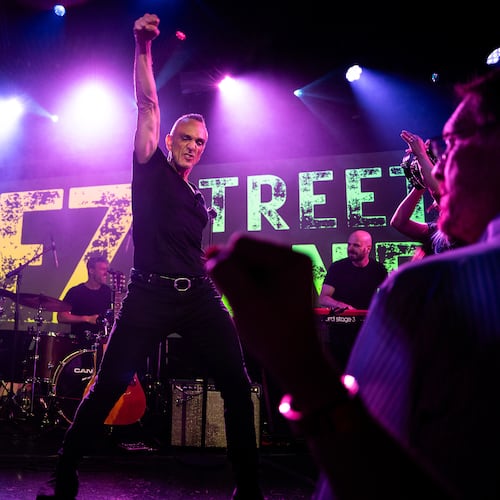This story was originally published by ArtsATL.
What are you, and how many times have you been asked that? Nicolette Emanuelle’s new show is not about asking such questions but giving the space to explore them fully to grant multiracial identity the complexity it is often denied. Inspired by Emanuelle’s experiences, “What Are You?” — part of the First Voices Festival, A Celebration of Indigenous Cultures at 7 Stages Theatre through Nov. 24 — uses a multitude of performance modes to take the audience on a journey through the life of a multiracial person to varying but ultimately impactful effect.
The show has undergone many iterations over the years, from art installation to short film to, ultimately, a multidisciplinary theatrical experience. It definitely cannot be called a play, at least not in the traditional sense, but it’s definitely theatrical, incorporating poetry, music, dance, shadow puppetry and even acrobatics into an immersive experience.
Emanuelle is joined by performance artists Meredith Gordon, Jacquelyn Pritz, Monica Martelly and Gryffin Thomas, with Arthur McDonald leading the night as a sort of vaguely threatening emcee type of character.
Credit: Photo courtesy of First Voices Festival
Credit: Photo courtesy of First Voices Festival
The show does not utilize a traditional seating structure, at times having the audience stand while the actors move in and out of the crowd, and at times having them seated upon pillows on the stage. This creates an intimacy that invites emotional engagement, augmented by the personable and appealing cast.
“What Are You?” does not have a defined plot but moves from segment to segment with minimal connective tissue between. McDonald is primarily used to usher the audience from one area to the next, and, while he does a good job of smoothing out the transitions, they can still feel a bit jarring.
In terms of structuring the segments, Emanuelle takes an iceberg approach, starting with a satirical game show that pokes fun at the seemingly banal, everyday microaggressions that multiracial people face. However, as the night goes on, it becomes increasingly personal, delving into the experiences of the actors. Racialized items such as a dream catcher, Afro pick, folding fan and straw hat take center stage at various points, standing in for different racial stereotypes.
Each performer’s strengths are realized, from Emanuelle’s acrobatic talents to Pritz’s comedic timing to McDonald’s natural charisma. Where Martelly and Pritz lean into their dance backgrounds, Gordon gives a stirring monologue about growing up as a Black child in America.
It’s difficult to say how much of the show comes directly from Emanuelle. So many specifics come from the experiences of the other performers, giving the entire piece more of a collective, devised feel. The personal nature of the piece allows it to speak to the differing experiences of the audience, while the informal staging encourages audience interjections. For example, many of the Black audience members in attendance voiced their relatability to Meredith Gordon growing up in Black church culture.
Some segments are more successful than others, with the initial game show joke quickly wearing out its welcome. Perhaps this is intentional — an attempt to showcase how wearying it can be to be asked endless questions about your ethnicity. Even if that is the case, however, the next segment is so openhearted and welcoming that it undercuts any intended alienation effect.
Credit: Photo courtesy of First Voices Festival
Credit: Photo courtesy of First Voices Festival
There is also a level of didacticism that prevents the first segment from meshing into the rest of the show easily. Thomas steps in at multiple times as the “Joke Interpreter,” explaining racial stereotypes with which the audience may be unfamiliar. Considering how little is explained in the later segments, this initial segment may have been better off had the microaggressions remained unexplained, especially since most of them aren’t brought up again after the game show segment.
The show is generally stronger after the first segment. Its best moments are the penultimate performance of Act 1 (featuring Emanuelle and a dream catcher) and the final scene with Emanuelle. The former is the most visually striking moment in the show, while the latter is the most direct.
At its core, “What Are You?” is about rebuking the simplicity in its titular question. No one who has ever been asked can answer simply and truthfully, and Emanuelle and company are resolved not to give simple answers. The show grapples with the stereotypes and iconography that would reduce heritage and identity into easily recognized symbols, while asking the audience to reflect on how they might have been victims or perpetrators of this behavior. If the end result is occasionally messy, it’s an important and welcome mess — one that deserves to be embraced.
THEATER REVIEW
“What Are You?”
Through Nov. 24 at 7 Stages Theatre. 7:30 p.m. Thursdays-Saturdays, 5 p.m. Sundays. $15-$70. 1105 Euclid Ave. NE, Atlanta. 7stages.org
::
Luke Evans is an Atlanta-based writer, critic and dramaturge. He covers theater for ArtsATL and Broadway World Atlanta and has worked with theaters such as the Alliance, Actor’s Express, Out Front Theatre and Woodstock Arts. He’s a graduate of Oglethorpe University, where he earned his bachelor’s degree, and the University of Houston, where he earned his master’s.
Credit: ArtsATL
Credit: ArtsATL
MEET OUR PARTNER
ArtsATL (artsatl.org) is a nonprofit organization that plays a critical role in educating and informing audiences about metro Atlanta’s arts and culture. ArtsATL, founded in 2009, helps build a sustainable arts community contributing to the economic and cultural health of the city.
If you have any questions about this partnership or others, please contact Senior Manager of Partnerships Nicole Williams at nicole.williams@ajc.com.
About the Author
Keep Reading
The Latest
Featured






